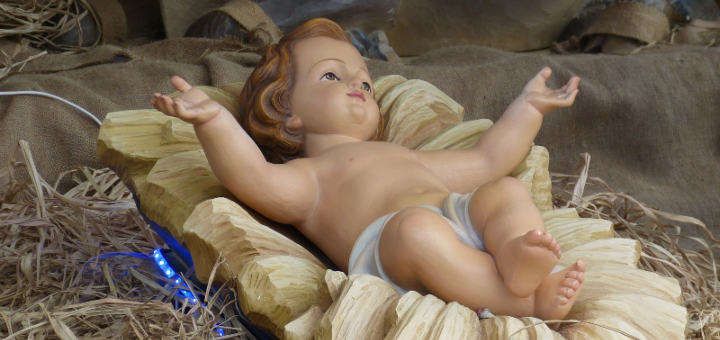
 Image credit: Pixabay.com (2012), CC0 Public Domain[/caption]
My older, wiser, more pious friend invited me to what she termed a “recollection,” a monthly meditation on a particular topic given by a priest. I had gone once before in the dead of winter and had found the evening, which was comprised of twenty women of disparate ages meeting in a chapel set up in the basement of a home, to be a lovely, cozy, thoughtful affair.
The evening’s topic was “The Bright and Cheerful Home.” The priest invited us to enter into the example of the Holy Family to find inspiration. I rarely have more than five contiguous minutes to sit uninterrupted, and I discovered, to my dismay, that my attention span has diminished to the length of a six-year-old boy’s.
To keep myself focused, I jotted down a few notes and meditated on a painting of the Holy Family, trying particularly to encounter the Baby Jesus. The Jesus on the cross and in the Gospels, while familiar, is still a grown man, and Lord knows I have a hard enough time relating to grown men right in front of me. But children, and especially baby boys, those I know and love. This concept of learning to love Jesus by encountering him as a child was completely foreign to me as a Protestant. I was introduced to it through St. Josemaría Escrivá and later by St. Faustina and St. Alphonsus Liguori. St. Josemaría would pick up statues of the infant Jesus to sing to him, rock him, and talk with him. “I like to see you as a little boy, a helpless child,” he wrote, “because it makes me feel like you need me.”
St. Faustina, in a mystical experience on Christmas Eve, was given the grace to hold the Child Jesus who impressed upon her “how good He found it to be next to [her] heart.” A longer meditation on the Child Jesus comes from St. Alphonsus Liguori who references, in “The Eternal Word Being Great Becomes Little,” earlier writings on the subject by St. Peter Chrysologus:
Image credit: Pixabay.com (2012), CC0 Public Domain[/caption]
My older, wiser, more pious friend invited me to what she termed a “recollection,” a monthly meditation on a particular topic given by a priest. I had gone once before in the dead of winter and had found the evening, which was comprised of twenty women of disparate ages meeting in a chapel set up in the basement of a home, to be a lovely, cozy, thoughtful affair.
The evening’s topic was “The Bright and Cheerful Home.” The priest invited us to enter into the example of the Holy Family to find inspiration. I rarely have more than five contiguous minutes to sit uninterrupted, and I discovered, to my dismay, that my attention span has diminished to the length of a six-year-old boy’s.
To keep myself focused, I jotted down a few notes and meditated on a painting of the Holy Family, trying particularly to encounter the Baby Jesus. The Jesus on the cross and in the Gospels, while familiar, is still a grown man, and Lord knows I have a hard enough time relating to grown men right in front of me. But children, and especially baby boys, those I know and love. This concept of learning to love Jesus by encountering him as a child was completely foreign to me as a Protestant. I was introduced to it through St. Josemaría Escrivá and later by St. Faustina and St. Alphonsus Liguori. St. Josemaría would pick up statues of the infant Jesus to sing to him, rock him, and talk with him. “I like to see you as a little boy, a helpless child,” he wrote, “because it makes me feel like you need me.”
St. Faustina, in a mystical experience on Christmas Eve, was given the grace to hold the Child Jesus who impressed upon her “how good He found it to be next to [her] heart.” A longer meditation on the Child Jesus comes from St. Alphonsus Liguori who references, in “The Eternal Word Being Great Becomes Little,” earlier writings on the subject by St. Peter Chrysologus:
If the Redeemer had come to be feared and respected by men, He would have come as a full-grown man and with royal dignity: but because He came to gain our love, He chose to come and to show Himself as an infant and the poorest of infants, born in a cold stable between two animals, laid in a manger on straw, without clothing or fire to warm His shivering limbs: "Thus would He be born, who willed to be loved and not feared" [emphasis mine].He desires most to be loved! What other way could he have chosen to come that would have incited more love than as a vulnerable baby and a poor one at that? Despite the Fall and our muddled thinking, we retain enough vestigial goodness to be moved to love when faced with the sight of a poor, shivering baby. How he must desire to be loved by us! What can I learn about the Heart of Jesus from my experience of my own young children’s love? They love without reserve. They forgive readily. They desire to be near me, often flinging themselves into my arms. They are delighted by my presence and are elated when I return to them. They fall over themselves to tell me things, to show me their latest stunts, to connect with me in every way. They hide nothing of themselves, keep nothing back, and play no games in love, the kind those of us who have been hurt by love are prone to play. Their love is innocent, fervent, and complete. Can I believe this about Jesus? In the form of an adult man, it is more difficult for me. I have been hurt by the “love” of adult men. But in the form of a small child, I can. Here -- in the Child Jesus -- is where I can truly encounter the Divine Love.
Copyright 2018 Amanda Woodiel
About the Author

Amanda Woodiel
Amanda Woodiel is a Catholic convert, a mother to five children ages 14 to 6, a slipshod housekeeper, an enamored wife, and a “good enough” homeschooler who believes that the circumstances of life—both good and bad—are pregnant with grace. Her oldest son was diagnosed with cancer in the summer of 2022, which is providing plenty of opportunities to test that hypothesis.


.png?width=1806&height=731&name=CatholicMom_hcfm_logo1_pos_871c_2728c%20(002).png)
Comments